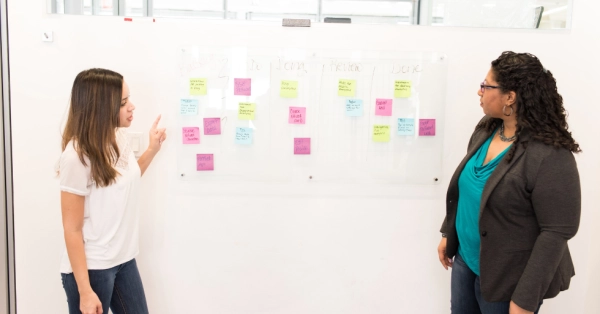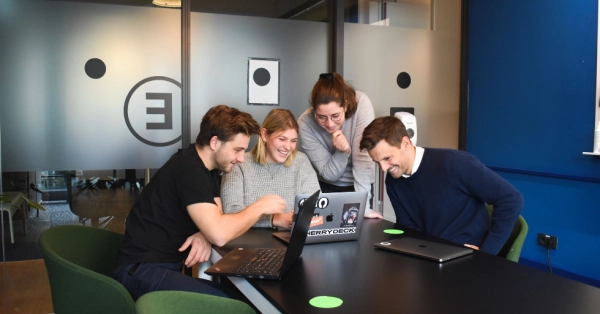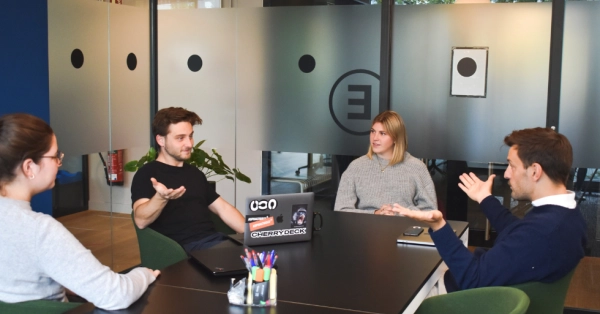For startups, finding the right people to complete the teams is a challenging process, and in the context of the pandemic, team dynamics and human resource management seem even more complicated. Here's how you can get the people you need on your team.

A very good idea needs to be developed by the right team so that it can become a real and sustainable business. For startups, the recruiting strategy and the focus on the process itself can come with challenges, especially if the core team lacks recruiting experience or if the necessary resources seem to be lacking. Discover the insights provided by the Jobful team below!
How does recruiting for startups differ from recruiting for large companies?
The first difference concerns the size of the teams. In a small team, it becomes obvious pretty quick if a person is or isn't a good fit for the role they've been assigned. The culture, mission and vision are more authentic and visible in startups than in most larger companies, for example.
Moreover, the differences are also obvious at the level of specialization of the employees. More often than not, in a startup it helps to wear as many "hats" as possible, says Mihai: "It helps if someone from the team has done lead generation before when putting the process together. Expertise components that can cover a new area are always relevant. In the corporate environment, from my experience, the work one has to do is very low on creativity".
What has changed in recent years in the recruitment process
In Mihai's opinion, "Until recently (in the candidate selection process), the focus was on experience and studies". "Today we see more and more differences at the level of transversal skills or soft skills such as critical thinking, emotional intelligence, teamwork, leadership". There is more interest in how candidates handle a problem: do they prefer to solve it or bury it? There are broader perspectives to define how well a person fits in the organization.
How and where to find resources when you feel like you can't expand your team
-
Mihai believes that the points of the vicious circle entrepreneurs often enter can be challenged (especially in the case of the belief "I don't have money to hire people, so I don't have people to grow my business, and since the business doesn't grow, I don't have money to hire people"):
-
When resources are scarce, you may find people willing to work without getting paid because they believe in the idea too (and this is another form of validating your idea).
-
If you don't have the necessary funds, but you have a good idea that you think is needed on the market, you can contact some potential customers to talk to them about it. You can give them the time frame required for the project and ask them if they want to be part of the pilot project. If the need really exists, and the solution is complete and well-articulated, there may be companies willing to pay up front.
-
But if the world around you doesn't see the value of what you want to build, this may be a sign that you are too emotionally attached to that idea.
Jobful's insights from experience on building a team in a startup
In the beginning, with the "fail fast" philosophy in mind (before the idea consumes too many resources), Mihai says that the first benchmark he had was to see who they could work with and in what format so as to achieve they were trying to: "let's see with whom, in what format we want to do it and what we want to do".
His intuition sent him to the people that were closest to him and in touch with the topic of gamification, who were most active during that period. That was a point where no team member had an active financial component – it was more a way for them to figure out what they could and couldn't do together.
Later, after Ilinca joined the team, they took the processes to the next level, and all the people involved became employees of the company. So, the second benchmark depends on "how quickly you get to supporting that business".
The third benchmark came once with the development of the team in a relatively short time: "I have always been the type pf guy who takes on only risks that he can carry for a certain period of time, who takes action before everyone sees that things are for sure heading that way. It was very difficult for me to accept a situation where I don't know where I will take money from to pay the salaries I will have to pay in a few months", says Mihai. He believes that risks are unavoidable for sure, but he thinks it is better to take things one step at a time, rather than "jump head first".
The team resonates with Whatsapp's organizational structure model – they analyze where Jobful's capabilities and activity can be supplemented with as powerful a layer of technology as possible, so that they don't get to 3 or 4 thousand employees only to soon have to lay off a few hundreds, as others did. Their objective is to grow organically, where needed and as much as needed.
How do you recruit – the process
Figures show that 98% of candidates get lost in the recruitment process (i.e. from the first steps to accepting an offer), and most get lost in the first part – getting to know the job, the employer, the candidate. That's why it's important to pay attention to all the phases of the process.
-
Sometimes people you are targeting may not be present on the mediums/channels you are thinking of. Therefore, at this point it is very important to do some research.
-
Pay attention to your online presence: in addition to your website, Facebook page, etc., how present is your brand online? Your brand consists of the product or service you offer, the market's perception regarding your product or service, and the people who make up your team. If the people in your team share posts with relevant content about your brand on their social media platforms, then the chances of spreading the word and increasing your online visibility will go up significantly.
-
Adapt communication to the context: for example, during the pandemic, when it became clear that the recruitment process will move online and that candidates will no longer be able to come to the office for interviews, the solution offered by Jobful was very useful for companies that had vacant positions, so it was these messages that were emphasized.
What tools and techniques can you use in recruiting
-
Google Trends – helps you see what people are looking for on the internet, what their behavior is and how this might relate to your marketing or business efforts
-
Google Alerts – is a tool that helps you find out as quickly as possible when someone writes about your company or the industry it belongs to. For example, the people at Jobful used it to monitor the news published on the topic of layoffs.
-
Hotjar – is a tool that helps to optimize conversions from a website. Concretely, it shows which items users click on, and what the route they take once they get on a website is. “(Without Hotjar) We would have probably reached some of the conclusions that helped us significantly improve the product later", says Ilinca.
-
Studies in the area of consultancy
-
Reddit and GitHub - are a source of information about potential employees and topics they are discussing
-
Jobful also uses high impact micro-experiences to test and screen candidates.
Posts calendar in a recruitment campaign
Before discussing a calendar of posts and percentages in addressing some topics, the most important thing is to define your goals, says Ilinca. If your goal is to increase the number of candidates, then 90% of communications will have to be about this topic, she adds. If your goals are business goals, 70% of the effort, communications, budget will have to be focused on the lead generation and B2B area. The best mix is determined according to the business objectives.
How recruitment dynamics are changing due to the pandemic
Until the beginning of the pandemic, Romanian employers (and not only them) were facing a personnel crisis. The number of investments was going up, companies were hiring and there was a certain degree of comfort for the people who had the profile the companies that collaborate with Jobful for recruitment were looking for. But things changed once the crisis hit: "(candidates) became much more active, they started looking for jobs themselves rather than waiting to be invited, and the dynamic became more active (...) It's easier to push from both sides to complete the recruitment processes," explains Mihai.
About the speakers
Mihai Cepoi is the CEO and co-founder of Jobful, the first gamification recruitment platform in Romania.
Ilinca Drăgănescu is Jobful's CMO. She combines the experience she has in marketing and employer branding with her characteristic enthusiasm and creativity.
Launched in May 2018, the platform is dedicated both to young professionals who want to develop their careers, and to companies that want to streamline the recruitment process by testing the candidates and their interest. From August 2018 to March 2019, Jobful participated in the first series of the KPMG Grow Pad accelerator. In December 2018, it won third place in Startarium, and in April 2019, it was accepted into the SAP.io accelerator in Berlin. In 2019, Jobful was one of the three startups of Romania selected to present their product in South East Europe Tech Tour 2019. In June 2019, the company participated in another funding round and raised 100,000 euros, an amount that will be invested in the development of the platform and a mobile app.











